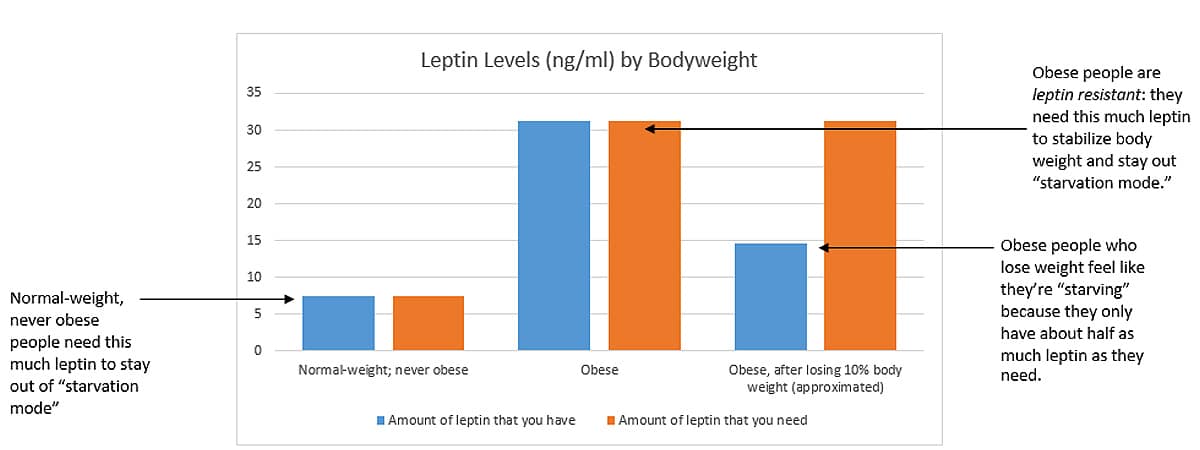The name comes from the Greek word "leptos," meaning thin. But it's a lot more complicated than just "more leptin = less fat!" This article will explore what leptin is, and how it’s relevant to weight loss and obesity. Next week, we’ll look at practical ways to help improve leptin levels for easier weight loss or maintenance.
What Is Leptin?
Leptin is a hormone that controls appetite and body weight. It’s made in fat cells, which use it to talk to the brain about how much stored energy you have available. The more fat cells you have, the more leptin you have.
We used to think that leptin was a kind of “satiety signal” that would lower your appetite when you had enough energy stores for the time being – kind of like a built-in way to prevent us from getting too fat. But from an evolutionary perspective, this makes no sense: humans didn’t need a built-in defense against getting too fat until the past 50 years or so. That simply wasn’t an issue for us. What we needed was a defense against getting too thin: something that would turn up the “starvation signal” and get us motivated to go find something to eat.
That’s the latest perspective on leptin, too. Leptin seems to work as a kind of emergency starvation alarm. When leptin levels dip below a certain level, it’s a signal to batten down the hatches, slow the metabolic rate, and get hungry for everything in sight to put some skin back on your bones.
So far, so good. It’s a useful adaptation to have, even if we don’t have much call to for it these days. But there’s a catch: in obese people, leptin signaling gets all out of whack, which can make it difficult or impossible to lose the weight.
Leptin and Obesity
Most people with obesity are struggling with a problem called leptin resistance (if you’re familiar with insulin resistance, it’s the same idea). In leptin resistance, the brain needs a lot more leptin than usual to get the message that “everything’s fine.” Here’s a table to show how it works.
| Normal-weight person | Obese person | |
| Normal leptin levels | The message: “everything’s fine.” | The message: “you are starving to death!” |
| Very high leptin levels | -- | The message: “everything’s fine.” |
Leptin is produced in fat tissue, so the only way to get those very high leptin levels is to put on more and more body fat. That’s why it’s so hard for obese people to lose weight: when they drop down to a healthier level of body fat, and start producing a more normal level of leptin, the signal to their brain is, “you’re starving!” An obese person who loses 20 pounds might still be obese, but her brain now thinks she’s starving to death, and is pulling out all the stops to get that person to eat more.
This is a lot less confusing as a chart: here’s one showing the leptin levels of normal-weight, obese, and weight-reduced people (data from this study):

(The study cites a 53% reduction in serum leptin for obese subjects who lost 10% of their body weight)
Is it any wonder that weight loss is so hard to maintain? Your brain literally thinks you’re starving to death, and the only way to survive is to accumulate more body fat.
Leptin and Treatments for Obesity
Here’s what we know so far:
- Leptin is a powerful regulator of appetite and body weight.
- Overweight and obese people need more leptin to turn off their drive to eat.
This suggests two possible solutions:
- Find some way to lower the leptin needs of overweight and obese people. Lower leptin needs = less body fat required to meet those needs = easier weight loss.
- Or, find some way to raise leptin levels without adding more body fat. Basically, this method would replace leptin from body fat with leptin from a pill, supplement, or injection.

In the first few years after leptin was discovered, scientists were chasing the second option: they thought that leptin supplements were going to be a miracle cure for obesity. Unfortunately, leptin supplements don’t do a lick of good for most obese people, because people who are obese and have not lost weight already have plenty of leptin. You can see this on the chart: for obese people, the amount of leptin they have and the amount of leptin they need is the same. More leptin will not solve anything here. (There are a few exceptions to this rule in the case of very rare genetic diseases, but for the vast majority of people, more leptin does not magically create weight loss).
On the other hand, leptin supplements do show some promise for people who were previously obese but have since lost weight. For example, in this study, obese subjects first lost 10% of their body weight (an average weight loss of around 40 pounds). Then they got either leptin injections or a placebo, and the researchers looked at their brain activity in an MRI. The subjects with the leptin injections showed different patterns of brain activation in response to food cues – basically, the supplemental leptin stopped their brain from freaking out quite so much in response to the weight loss.
If you think about this, it makes perfect sense. The brain of an obese person needs more leptin than normal to feel full and get out of starvation mode. In people who are obese, this leptin is provided by their extra fat stores. So if an obese person loses weight, a leptin supplement can replace those fat stores, and keep delivering the massive leptin overload needed to keep that person’s brain out of panic mode. You can see this on the chart in the bars for obese people who lost 10% of body weight. The leptin supplement could help make up that gap between how much leptin they have and how much leptin they need.
Unfortunately, you’ll notice something else about this paper: the leptin was delivered as an injection. You can’t just take a pill with leptin; it would get broken down in your stomach and wouldn’t do you any good. Commercial “leptin supplement pills” are actually supplements of other substances that are supposed to raise leptin levels, and they just aren’t very effective.
So is there any solution? Plenty of other options exist for managing leptin levels and improving leptin sensitivity: you can learn all about them in The Appetite Hormone, Part 2: Managing Leptin Levels.





Leave a Reply